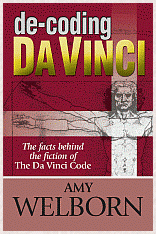De-Coding Da Vinci goes global !
Hmmm….????.. and why didn’t I know about this book?
Well, better to find out later than never ;)
 http://www.amywelborn.com
http://www.amywelborn.comThe Da Vinci Code is a beach read for conspiracy theorists. But because Dan Brown claims that all descriptions of artwork, architecture, documents, and secret rituals in his novel are accurate, many readers greet even the book's dubious historical assertions with less skepticism than they otherwise might (as was demonstrated in this space March 11). What people forget is how narrow and clever Brown's defense actually is: one can describe a painting accurately without knowing the first thing about how to interpret it.
The pass given to The Da Vinci Code by people grateful for its entertainment is problematic because Dan Brown's interpretation of history beats Christianity into a pudding of pagan and feminine wonderfulness sprinkled with the moral teachings of a charismatic Jewish prophet. Scholars in Brown's novel believe that things went pear-shaped in the year 325, when the emperor Constantine allegedly appropriated the legacy of Jesus for his own cynical purposes.
The Da Vinci Code blames Constantine for promoting the divinity of Jesus as a means of consolidating his own power, and claims that Constantine's meddling -- ratified by a "close" vote at the Council of Nicaea -- distorted the New Testament, subverted the influence of Mary Magdalen, and wrote a blank check that Christianity's more patriarchal factions still use to justify their alleged fear of the "sacred feminine."
With a thesis like that down range, it's no wonder that taking shots at The Da Vinci Code has become a cottage industry among Christian writers. If Brown's revisionist reading of history were true, it would be even more astounding than the way that Jacques Cousteau went from being a legend in spear fishing to being an environmental activist. But almost everything Brown writes is bunk. Enter Amy Welborn, author of De-Coding Da Vinci, who fillets Brown's novel with the enthusiasm of a sushi chef on her first day of work at a waterfront restaurant.
As a former high school teacher and a lay Catholic theologian with several books to her credit, Welborn is admirably suited for the task she undertakes, which is to make epistemology accessible to the general public by exposing the termite-ridden foundations of Dan Brown's unwitting Gnosticism. Keenly aware of the critics who say, "relax, it's only a novel," Welborn explains that culture matters, and that "in The Da Vinci Code, imaginative detail and false historical assertions are presented as facts and the fruit of serious historical research, which they simply are not." Every chapter in De-Coding Da Vinci ends with suggestions for further reading and lists of questions for review and discussion.
More here:
http://www.spectator.org



0 Comments:
Post a Comment
<< Home